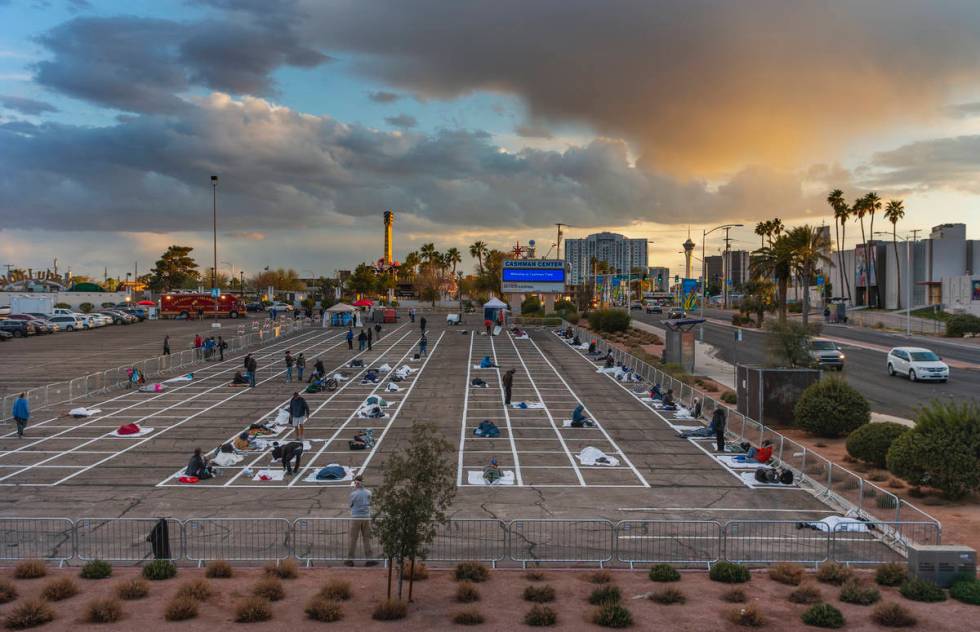Put homeless in Vegas hotels during coronavirus shutdown? No. Here’s why

Should Las Vegas resort operators grant the wishes of advocates who are suggesting that the homeless be sheltered in some of the city’s nearly 150,000 vacant hotel rooms during the coronavirus crisis?
While it may seem insensitive to the plight of the homeless, resort operators should politely, but firmly, say no. Here’s why.
The companies that have invested billions of dollars to make Las Vegas the most entertaining and compelling resort destination on Earth must protect that investment. They should continue to do what they’re doing: protect the interests of their employees, donate money and other resources to organizations within the community run by professionals on the ground and plan for the eventual return of business sometime after April 30 — and prepare for the next disaster.
Resorts were dragged into this scenario by well-meaning but misguided advocates as a result of the poor optics of an emergency sheltering situation in Las Vegas.
Last month, Catholic Charities of Southern Nevada was forced to close its 516-bed shelter when it was discovered that a homeless man and a shelter employee had tested positive for COVID-19.
Suddenly, those normally sheltered by Catholic Charities had nowhere to go. Clark County and the city of Las Vegas quickly mapped out a plan to provide space in the Cashman Center parking lot for people to camp out. In an effort to provide a visualization for social distancing, gridded boxes designed to keep the sheltered 6 feet apart were drawn on the pavement.
Organizers actually tried to provide padded carpeting atop the pavement, but that was deemed problematic because the carpeting couldn’t be adequately cleaned in time.
Meanwhile, the county and the city worked to build a covered isolation facility, with the county pitching in $6 million to build, equip and staff it.
But people around the world saw images of the homeless camped out on the asphalt while vacant hotels, ordered closed by Gov. Steve Sisolak, stood nearby. As the calendar turned to April, social media criticism ensued.
Former Housing and Urban Development Secretary Julian Castro, a former Democratic presidential candidate, was among those who chimed in.
“There are 150,000 hotel rooms in Vegas going unused right now,” he wrote on Twitter. “How about public-private cooperation (resources) to temporarily house them there? And fund permanent housing!”
Funding permanent housing, sure. Opening hotel rooms to the homeless, no.
Mehmet Erdem, associate professor of hotel operations and technology at UNLV’s College of Hospitality, said using hotel rooms for homeless people or even hospital patients would provide operational issues for resorts as well as a brand image problem. “Helping out is good PR,” he said. “At the same time, you have to understand they’re not running a charity. They are obligated to the stockholders and other constituents.”
Brendan Bussmann, a gaming industry analyst for Las Vegas-based Global Market Advisors, LLC, said housing the homeless could damage a hotel’s brand and would force resort companies to hire additional personnel to secure their buildings.
“You’re trying to cordon off hotel rooms that typically are in the center of these minicities to be able to potentially house a bunch of people over an unknown course of time,” he said.
Bill Higgs, an authority on corporate culture who wrote “Culture Code Champions: 7 Steps to Scale & Succeed in Your Business,” said hotel companies are better off donating money and resources to health care organizations and food banks, along with possibly housing first responders or the National Guard — if necessary.
“The hotels are all about taking care of people,” said Higgs.
In New York, the Four Seasons Hotel is housing medical first responders so they don’t have to commute from their hospitals to their homes.
Erdem said one of the takeaways of the coronavirus disaster is that Nevada should do some contingency planning for the future.
“Wouldn’t it make sense to have a plan in place to accommodate 40,000 Californians here if there was a devastating earthquake?” he asked.
Contact Richard N. Velotta at rvelotta@reviewjournal.com or 702-477-3893. Follow @RickVelotta on Twitter.